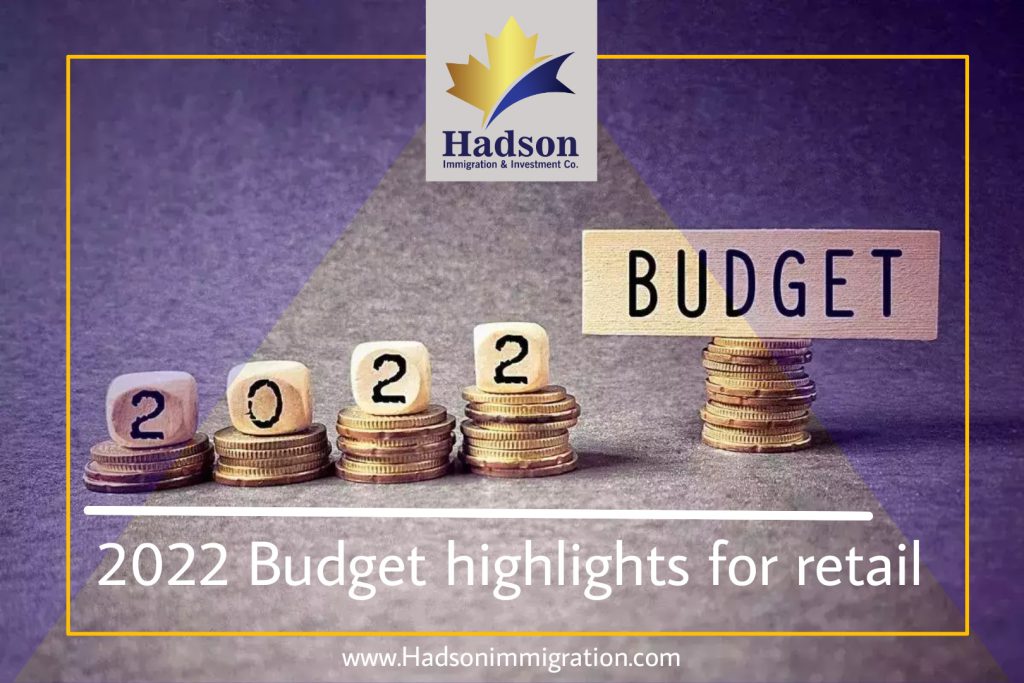2022 Budget highlights for retail
Small business tax rate, credit card fees
The federal government released its 2022 Budget. Outside of some of the larger items on dental care and military spending, there were some notable items for retailers, including:
Small business tax rate:
Access to the small business tax rate would be phased away when taxable capital reaches $50 million, as opposed to $15 million.
Credit card fees:
Recommitted to reducing the cost of credit card fees in a manner that promotes small companies and protects consumers’ existing reward points;
Investment of $29.3 million over three years to develop a Trusted Employer Model that will cut red tape for the highest standard repeat employers – with excellent living conditions, protections, and compensation in high-demand industries for temporary foreign workers. In the coming year, additional information about this program will be released;
Temporary Foreign Workers:
$29.3 million investment over three years to introduce a Trusted Employer Model which will reduce red tape for highest standard repeat employers – with exceptional living conditions, protections, and wages in high-demand fields. Further details on this program will be announced in the coming year;
Employment program for those with disabilities:
Budget 2022 recommends allocating $272,6 million over five years to the Opportunities Fund to promote the development of an employment strategy for those with impairments. This will assist address labor market shortages by increasing the participation of people with impairments and making workplaces more accessible;
Changes to the cannabis tax framework:
Permit licensed cannabis producers to remit excise duties quarterly rather than monthly, permit the Canada Revenue Agency (CRA) to approve certain contracts for service arrangements between two licensed cannabis producers, amend penalty provisions, and exempt holders of a Health Canada issued Research License or Cannabis Drug License from the requirement to be licensed under the excise duty regime.
Elimination of the retail sales tax on home insurance for one year
50% off the cost of registering passenger vehicles, light trucks and taxis for one year
No provincial tax or fee increases
On-track to balance budget by 2026-27
Canada Expansion Fund:
Establishment of the Canada Growth Fund to attract significant private sector investment and achieve national economic objectives, such as decreasing emissions, reinforcing the economy through the growth of low-carbon businesses, and assisting the restructuring of vital supply networks;
Low-alcohol beer:
Beginning on July 1, 2022, the excise charge on low-alcohol beer will be eliminated. Excise duty on vaping items will also be eliminated.
Excise duty on vaping products:
Introduction of a federal excise tax on vaping items, encompassing both solid and liquid substances. Budget 2022 proposes to grant shops a transition period by permitting the sale of unstamped products in stock as of October 1, 2022, until January 1, 2023.
Accelerated tax write-offs:
Expanded to include air-source heat pumps for clean energy equipment investments by businesses.
Elimination of the retail sales tax on home insurance for one year.
50 per cent off the cost of registering passenger vehicles, light trucks and taxis for one year.
No provincial tax or fee increases.
Almost $46 million to lower child care to $10 per day.
Estimated $7 million for the Physical Activity Tax Credit, which provides families with a refundable tax credit of up to $2,000.
Personal measures
- Creation of the tax-free first home savings account (FHSA), allowing individuals to contribute up to CAD 8,000 per year (and CAD 40,000 over their lifetime), with the contributions being deductible to the taxpayer, income earned in the FHSA being tax-free, and withdrawals for the purchase of a first home being non-taxable. The first contribution is expected to be available in 2023.
- Expansion of the home buyer tax credit, providing up to CAD 1,500 in tax relief to eligible first-time home buyers on acquisitions made on or after 1 January 2022.
- Increase to the home accessibility tax credit, raising the annual expense limit to CAD 20,000, effectively increasing the maximum credit to CAD 3,000. This will apply to expenses incurred in 2022 and subsequent years.
In addition to housing-related measures, other announced modifications include:
- Introduction of a labour mobility deduction for tradespeople, providing up to CAD 4,000 of deduction per year where an individual incurs eligible expenses to temporarily relocate to obtain or maintain employment in a construction activity;
- Expansion of medical expense tax credits to include costs related to surrogacy and other expenses; and
- Consultation on a potential career extension tax credit aimed at boosting labor force participation by seniors who want to continue to work. No details or timing related to such a credit were provided.
Budget 2022 proposes to provide $84.2 million over four years to double funding for the Union Training and Innovation Program, which would each year help 3,500 apprentices from underrepresented groups—including women, newcomers, persons with disabilities, Indigenous peoples, and Black and racialized Canadians—begin and succeed in careers in the skilled trades through mentorship, career services, and job-matching.
The first step towards moving to Canada is to get an assessment of your specific situation. Call us today at +1 613.222.7154 for an assessment to see if you are eligible to move to Canada, or fill out our online assessment form.







